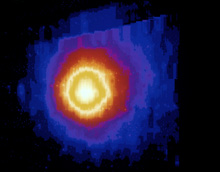If you wish to continue looking at the progress of H.R. 2616 and H.R. 2617, this may be helpful.
- LRK -
Use GovTrack to keep tabs on your representatives in Congress or to research pending legislation that might impact your life or business.
------------------------------
H.R. 2616: National Aeronautics and Space Administration Authorization Act of 2013
- Introduced:
- Sponsor:
- Status:
The bill’s title was written by the bill’s sponsor. H.R. stands for House of Representatives bill.
------------------------------
------------------------------
H.R. 2617: Apollo Lunar Landing Legacy Act
- Introduced:
- Sponsor:
- Status:
The bill’s title was written by the bill’s sponsor. H.R. stands for House of Representatives bill.
------------------------------
And if you have other Bills that interest you, check out the bills section and About Govtrack.us
- LRK -
------------------------------
Bills and Resolutions
Around 10,000 bills and resolutions are considered by the U.S. Congress in each two-year session, but of those only about 4% will become law. The current two-year session is called the 113th Congress.
Search for a Bill
Search for bills using the search box at the top right of every page, or use the advanced search to screen by status, subject, and other factors.
snip
------------------------------
Thanks for looking up with me.
- LRK -
==============================
- LRK -
Web Site: http://lkellogg.vttoth.
BlogSpot: http://
WordPress: http://lrkellogg.
RSS link: http://
Newsletter: https://mailman1.
==============================
BlogSpot: http://
WordPress: http://lrkellogg.
RSS link: http://
Newsletter: https://mailman1.
==============================
Moon Treaty
The Agreement Governing the Activities of States on the Moon and Other Celestial Bodies,[2] better known as the Moon Treaty or Moon Agreement, is an international treaty that turns jurisdiction of all celestial bodies (including the orbits around such bodies) over to the international community. Thus, all activities must conform to international law (notably this includes the UN Charter).
In practice it is a failed treaty since it has not been ratified by any nation which engages in self-launched manned space exploration or has plans to do so (e.g. the United States, some member states of the European Space Agency, Russian Federation, People's Republic of China,Japan, and India) since its creation in 1979, and thus has a negligible effect on actual spaceflight. As of 2013, it has been ratified by 15 states.[1]
snip
Ratification
The treaty was finalized in 1979 and entered into force for the ratifying parties in 1984. As a follow-on to the Outer Space Treaty, the Moon Treaty intended to establish a regime for the use of the Moon and other celestial bodies similar to the one established for the sea floor in the United Nations Convention on the Law of the Sea. The L5 Society successfully defeated the treaty in the US Senate.[3]
snip
==============================
Outer Space Treaty
The Outer Space Treaty, formally the Treaty on Principles Governing the Activities of States in the Exploration and Use of Outer Space, including the Moon and Other Celestial Bodies, is a treaty that forms the basis of international space law. The treaty was opened for signature in the United States, the United Kingdom, and the Soviet Union on 27 January 1967, and entered into force on 10 October 1967. As of May 2013, 102 countries are states parties to the treaty, while another 27 have signed the treaty but have not completed ratification.[1][2]
snip
==============================
Space Law
Space law is an area of the law that encompasses national and international law governing activities in outer space. International lawyers have been unable to agree on a uniform definition of the term "outer space", although most lawyers agree that outer space generally begins at the lowest altitude above sea level at which objects can orbit the Earth, approximately 100 km (60 mi).
The inception of the field of space law began with the launch of the world's first artificial satellite by the Soviet Union in October 1957. Named Sputnik 1, the satellite was launched as part of the International Geophysical Year. Since that time, space law has evolved and assumed more importance as mankind has increasingly come to use and rely on space-based resources.
snip
==============================
WHAT THE MIND CAN CONCEIVE, AND BELIEVE, IT WILL ACHIEVE - LRK -
==============================





No comments:
Post a Comment
Note: Only a member of this blog may post a comment.